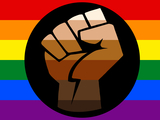Its impact on the American mainstream
This post is written by Sofia Encarnacion, a Diversity & Inclusion Peer at the Mosaic Center. Sofia is a rising junior Economics and Mathematics major. In her spare time, she likes to play Animal Crossing. She also finally watched Avatar the Last Airbender.
Paris is Burning is a 1990 documentary that explores drag ball culture and centers predominantly trans & gay people of color. The director, Jennie Livingston- a White cis lesbian woman- received multiple Academy awards for her work. The documentary’s trans, gay, people of color subjects remained in poverty and many had AIDs-related deaths. When I first watched the documentary a year ago, I felt attracted to and disappointed by the stories told. The glamour and opulence of the balls were a huge focus while the abandonment, homelessness, poverty, disease, and death had an “it is what it is” tone to it.
I’ve had a few conversations within my social circles about Paris Is Burning. Some regard it as a monumental piece of media for queer culture, others have never heard of it. The latter group was unfamiliar with a lot of drag culture in general, with the exception of RuPaul’s Drag Race. But both groups of people are familiar with terms like “tea” “werk,” "reading,” and “throwing shade” which all originate from drag ball culture. However, these are not the only examples of queer POC culture being popularized without recognition.
Madonna’s hit song “Vogue” and the dancing associated with it was directly inspired by the vogue dancers and choreographers from the Harlem ballroom scene. Many Black and Latinxartists and entertainers throughout history were queer, but that is often unacknowledged or erased. For historical figures, there wasn’t common usage of a term that identified bisexual or trans people, so historians also have difficulty determining the identities of people who are suspected to not be cishet.
I’m a 20-year-old bisexual, cis, Latina trying my best to navigate a wealth of history that continues to go unnoticed. After taking a few GWST classes - one of them being Queer Representation in Film and TV (GWST 321) - I still don’t know nearly enough about the impact of Black and Latinx queer content on American culture. How can I celebrate that Moonlight received recognition while knowing that the struggle and pain depicted is not at all fictional? I want these depictions to be realistic, but also include moments of queer POC joy and celebration. Depictions in media that appreciate instead of appropriate. How can I embrace the cultural importance of Paris is Burning while knowing that a White cis woman profitted off of Black and Brown trans lives in the process?
Despite the problematic aspects of the documentary, I still highly recommend people watch Paris Is Burning. It captures the essence of drag ball culture and the struggles many of the participants faced in a way that is easily accessible. It also shows the origin of slang still used today. If you’ve enjoyed RuPaul’s Drag Race, it is almost imperative to watch Paris Is Burning to understand the history of drag before studio executive directors became involved. Drag balls have historically been by and for trans and gay people of color, which is why some of RuPaul’s rules and statements have been criticized for being harmful. For a while, RuPaul’s show was the only mainstream representation of drag ball culture, but now there are other forms of drag ball culture entertainment that are more inclusive and nuanced (such as FX’s Pose).
Although it wouldn’t be enough to just watch Paris is Burning or Pose. I would highly recommend reading and viewing other perspectives to understand the complexities of queer POC culture in general. I’ve listed some courses, readings, and films that are recommended by us, the Diversity and Inclusion staff, for this purpose. If you have other reading or viewing recommendations, please include them in the comment section!
UMBC Courses:
GWST 100: Introduction to Gender and Women's Studies
GWST 321: Queer Representation in Film and TV
GWST 348: Black, Queer, and Feminist Film
Readings:
Is Paris Burning? From Black Looks by bell hooks
Mapping the Margins: Intersectionality, Identity Politics, and Violence Against Women of Color by Kimberlé Williams Crenshaw
Μaking Things Perfectly Queer:What Makes Queerness Most? By Alexander Doty
Fabulous: The Rise of the Beautiful Eccentric By Maddison Moore
Trap Door: Trans Cultural Production and the Politics of Visibility (Critical Anthologies in Art and Culture) By: Reina Gossett
Queering Bathrooms: Gender, Sexuality, and the Hygienic Imagination By Sheila L. Cavanagh
Black on Both Sides: A Racial History of Trans Identity by C. Riley Snorton
Films/Documentaries:
Paris Is Burning (1990)
Celluloid Closet (1995) (is also a book)
A Place in the Middle (2015)
Transagenda (2015)
“Passing” (2016)
Kiki (2017)
Happy Birthday, Marsha! (2018)
Disclosure (2020)
Trainings:
SafeZone LGBTQ+ Allyship Development Training
Posted: July 1, 2020, 11:19 AM
